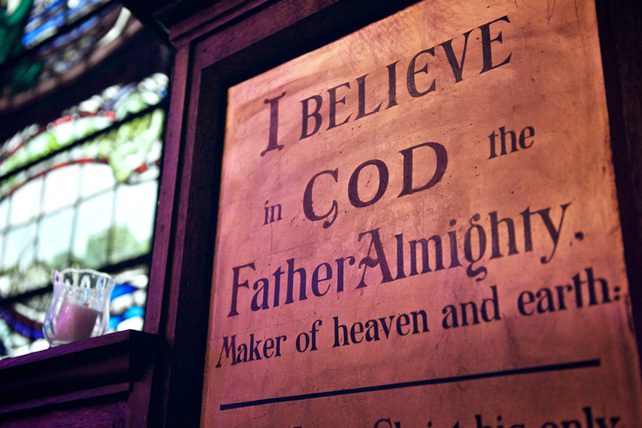
The snow kept falling, as strong winds began to howl. No one wanted to be caught in this sort of weather. With a fire roaring inside and friends gathered around the kitchen table, the family had hoped to ride out the night indoors. But the barn door had blown open, so someone needed to venture out and shut it.
The farmer and his son stepped outside in the swirling blizzard, grateful that they had hung a rope between the house and barn. Clinging tightly to it, they gradually made their way to the barn to fix the door. Then the rope guided them safely home, preventing them from getting lost in the whiteout.
Although this is a fictional scene from a Christmas episode of “The Little House on the Prairie,” it’s also a parable of the perils of discipleship today. My father-in-law, who farmed for 50 years in Iowa, recounted that when a blizzard was coming in, prairie residents needed that rope just to find their way back and forth. In a blinding snowstorm, even walking a brief distance could be confusing and disorienting. That familiar journey taken hundreds of times before could turn into strange terrain, leaving people to freeze in the cold winter night. But with the reliable rope, they knew they could always find their way back home.
Today we’re living in a cultural blizzard, as opinions about God, life, and faith swirl around us. TikTok and Instagram influencers vie for our attention, presenting hot takes and pithy arguments about what Christians should believe or how Christians should live. Meanwhile, our timelines are crowded with stories about church scandals and leadership failures. We wince as people use the name of Jesus for their own personal agendas.
Christianity is being corrupted and co-opted, leaving us believers disoriented and confused. If discipleship is about following Jesus, then the challenge of modern-day discipleship is that we can’t see him amid the snowstorm. We need a rope to help us find our way.
Becoming Fully Human
This inability to follow Jesus in a swirl of confusion affects our ability to both grow as disciples and make disciples. Why is this significant? Because discipleship is not spiritual extra credit that’s optional; it’s the ordinary Christian life. It is apprenticeship to Jesus, fully and completely. The goals of discipleship are to know Jesus, become like Jesus, and join Jesus in his work in the world. And discipleship’s “reward,” if we can put it like that, isn’t bonus points in the afterlife. It is to be a human, fully alive.
After God created humans in his image, he called us to reflect his love, wisdom, and order into the world. Sin is an infection that affected both our identity and our ability to fulfill this vocation. It fragmented what God had joined together, breaking our relationships with God, with one another, and with the created world.
Salvation is God’s work of putting the world back together through Jesus. But at the heart of that work is putting human beings back together. When humans are set right with God and then with one another, the Holy Spirit gives them power to join God’s mission of setting the world right.
Flourishing humans lead to flourishing communities, which in turn foster the conditions for flourishing humans. This cycle of flourishing starts with humans being set right with God. Professor N.T. Wright puts it like this: “[F]rom whatever angle you look at Jesus, he was concerned not just with outward structures, but with realities that would involve the entire person, the entire community. No point putting the world right if the people are still broken” (“Simply Jesus,” HarperOne).
So much discourse about human flourishing falls short because it fails to articulate the vision for what a human being is and what a human being is for. More than that, it fails to properly diagnose the problem, the obstacle to human flourishing: sin. Secular conversations about human flourishing aim at the right ordering of power and of communities for the good of all people. But for the Christian, human flourishing isn’t a generic vision of liberty, justice, and peace. It’s a particular vision of a life conformed to the image of the Son of God.

